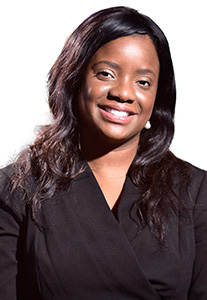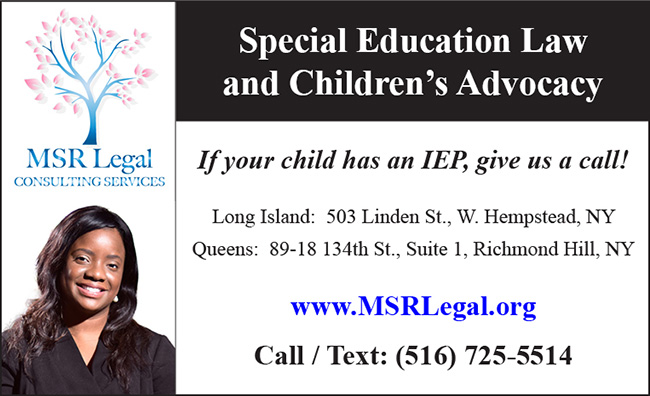One of the main objectives of the Individuals with Disabilities Education Act (IDEA) is to ensure that children receive an appropriate education that prepares them for further education, employment, and independent living.1 Accordingly, school districts must develop Transition Plans that are results-oriented. Transition Plans are designed to improve your child’s academic and functional achievement and to facilitate his or her movement from school to post-school activities.2

Oroma Mpi-Reynolds, Esq.
Post-school activities include:
- Post-secondary education,
- Vocational education,
- Integrated employment,
- Supported employment,
- Continuing and adult education,
- Adult services,
- Independent living, or
- Community participation.3
A Transition Plan should be a plan that:
- is based on your individual child’s needs;
- takes into account your child’s strengths, preferences, and interests;
- includes instruction and related services;
- includes community experiences;
- includes the development of employment and other post-school adult living objectives;
- includes the acquisition of daily living skills; and
- incorporates a functional vocational evaluation.4
In New York State, beginning at age 12, your school district should conduct an inventory of your child’s vocational and post-secondary interests.5 By age 14, districts in New York begin developing transition goals, aligned with your child’s academic goals, aimed at promoting a solid foundation for higher education or vocational interests.6 The IDEA requires that every individualized education program (IEP) created for a child aged 16 or older include appropriate, measurable post-secondary goals based upon age-appropriate transition assessments. 7 Your child should work on Transition Skills based upon his or her needs in particular areas.
An appropriate Transition Plan will include a coordinated set of activities, known as Transition Services.8 Transition Services, including courses of study, are needed to assist your child in reaching the postsecondary goals identified on his or her IEP. Your child should have regular, structured opportunities throughout the school day to acquire specific skills within community settings and to generalize those skills to a variety of home and community settings.9 Activities may include the development of customer service skills at the local grocery store; instruction on the safe use of public transportation; career and technical education; instruction towards career development and occupational standards; cooking; laundry; personal fitness; therapeutic recreation; leisure education; functional communication training; travel training; and social skills training.
With your or your adult child’s consent, the school should engage community resources and invite participating agencies to support a smooth transition to post-secondary life. For example, you may need:
- to petition the court for guardianship over your adult child;
- to apply for long-term care through your State’s home and community-based Medicaid waiver program; or
- a referral to your State’s Vocational Rehabilitation Services agency.
As your child approaches his or her pre-teenage years, try to learn as much as possible about your child’s post-secondary school interests. If possible, your child should attend all meetings where Transition Goals and Transition Services will be discussed. Then, think critically about whether your child is on track to attain the practical skills necessary to live productively and independently. Which basic skills does your child lack? Does your child have a means of functional communication? Can your child get dressed in the morning? Send a text message? Travel on public transportation? Understand traffic signals? Complete a job application online? Count money? Operate an ATM machine or write a check?
Even if your child is already in high school, it is not too late to obtain appropriate Transition Services before he or she graduates or exits at age 21. An independent educational vocational assessment funded by your school district may shed light on the Transition Goals and Transition Services that your child needs. Seek out advocacy support or legal representation when necessary to preserve your child’s right to an appropriate Transition Plan.
For more information, email Oroma Mpi-Reynolds, Esq. at Oroma@MSRLegal.Org or visit www.MSRLegal.Org. Oroma is the founder and managing attorney of MSR Legal & Consulting Services PLLC, a New York-based special needs law practice with offices in Queens and Nassau County. Oroma primarily focuses on enforcing the rights of children (from birth to age 21) under the IDEA and Section 504 of the Rehabilitation Act. Since 2008, she has represented parents and school districts alike, including the New York City Department of Education and several Long Island boards of education. Immediately prior to opening MSR Legal, Oroma served for two years as the Director of Legal Services for Gersh Academy, a private school for children with Autism Spectrum Disorder. She holds a Bachelor of Arts degree in Anthropology with a concentration in sociocultural anthropology from Yale University, and a Juris Doctor degree from the Benjamin N. Cardozo School of Law of Yeshiva University. Oroma frequently blogs about the impact of the coronavirus pandemic on special needs parenting. Her posts can be found here: https://www.msrlegal.org/special-needs-parenting-the-coronavirus
Footnotes
- 20 U.S.C. § 1400(d)(1)(A)
- 34 C.F.R. § 300.43(a)(1)
- 20 U.S.C. § 1401(34)(A); 34 C.F.R. § 300.43(a)(1)-(2)
- 20 U.S.C.§ 1401(34)(B)-(C)
- 8 N.Y.C.R.R. § 200.4(b)(6)(viii)
- 8 N.Y.C.R.R. § 200.4(d)(2)(ix)(a)
- 20 U.S.C. § 1414(d)(1)(A)(i)(VIII); 34 C.F.R. § 300.320(b)(1)
- 34 C.F.R. § 300.43(a)
- Ex Parte James, 713 So. 2d 869, 925 (Ala. 1997)





